William F. Buckley: Bush Will Be Judged on “Failed” Iraq War
If he'd invented the Bill of Rights it wouldn't get him out of his jam,Ӕ the father of the American conservative movement says of the president, in a Bloomberg News interview with Judy Woodruff Read it in full Watch it Read interview excerpts .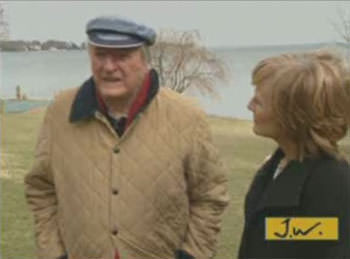
If he’d invented the Bill of Rights it wouldn’t get him out of his jam,Ӕ the father of the American conservative movement says of the president, in a Bloomberg News interview with Judy Woodruff. Buckley also calls Rumsfeld a “failed executor” of the war, but maintains that Cheney was misled on the WMD issue.
Or read it in full below:
Bloomberg
:
INTERVIEW OF WILLIAM F. BUCKLEY, JR.
BY JUDY WOODRUFF
AS BROADCAST Mar. 22, 2006
MR. BUCKLEY: In 1955, it was generally assumed that conservatives, A, didn’t think. To the extent that they did think, it was simply because they needed to emanate in some way their special interests. They were easily depicted as fat and lazy and cigar-smoking and uninteresting.
MS. WOODRUFF: You were famous for this line when you launched the National Review: We will stand athwart history and yell stop. Did you succeed?
MR. BUCKLEY: Well, in a sense we did, because when I wrote that line, which was for an editorial in the first issue, I had primarily in mind the claims of Marxism. Marxism presented itself as an absolute irreversible call of history. The historic claims of communism were going to assert themselves and make everything else sound irrelevant. So in that sense, I said we are athwart history yelling stop. And the answer is that absolutely did happen, most formally with the end of communism, the [inaudible] of communism in 1991.
MS. WOODRUFF: Do you have any major regrets along the way about positions that you espoused or people you championed?
MR. BUCKLEY: I think we made a mistake in 1962 in opposing the Civil Rights Act. There were two or three acts that– The one that was opposed by Goldwater, who in the matter, by the way, was constitutionally advised by a man who 10 years later was Chief Justice of the United States.
MS. WOODRUFF: William Rehnquist.
MR. BUCKLEY: On the Civil Rights bill. And we were persuaded that was correct. I regret it. I think that the impact of that bill should have been welcomed by us. And that sort of transcended what would have become a constitutional formalism.
I’m also sad that there wasn’t as much of an evolution in libertarian policies as I’d have liked to have seen. It’s simply accepted by everyone, including workaday conservatives, that education and health are substantially statist enterprises. I regret this. I think it was a surrender in principle and an abandonment of ideas that might have profited the republic hugely.
MS. WOODRUFF: Federal spending as a percentage of the gross national product is 20 percent. It was 17 percent when you started the National Review. Conservatism has succeeded and government’s bigger. Is that a contradiction?
MR. BUCKLEY: No, it’s not necessarily a contradiction because you have to ask would it have been bigger yet.
But it would be useful, I think, if one could routinely read an index that communicated to you the extent to which government was absorbing more and more of the gross national product and taking on functions which would have been best handled by the private sector.
MS. WOODRUFF George W. Bush is widely considered to be a domestic conservative, and yet–you talk about spending–he’s the one who oversaw the passage of this big Medicare prescription drug program, the biggest, what, expansion of entitlements in 40 years. Is George W. Bush really a conservative?
MR. BUCKLEY: Well, I think he is really a conservative, but I think that he simply has not exerted himself at that level of traditional conservative concern for federal expansion. And you correctly point out that that medical bill is overwhelming in terms of its claims on federal spending.
So the answer is no, George W. Bush has not assigned particular attention to that. He’s never even vetoed a spending bill. So that his concern has been so completely on the international scope that he can be said to have neglected conservatism at the level you speak of.
SEGMENT II
MS. WOODRUFF: You generated a fair amount of attention recently when you wrote that the Bush policy in Iraq, you know, had failed, and you said they now have to cope with failure. You talked about how hard it’s going to be for the president to step back from what you call his high-flown pronouncements.
I want to ask why you supported this war in the first place.
MR. BUCKLEY: I resisted endorsing a potential war, as it then was, up until a moment when Mr. Cheney gave a speech in which he spoke absolutely positively about these weapons of mass destruction. We know now that they did not exist, but we also know that they were thought to exist by the most sophisticated intelligence sources–and not, by any means, all American; they were Israeli, German, French, English. So that we went into war assuming that we were stopping him from deploying those weapons.
We found out that they weren’t there. What we then proceeded to do has not worked. That’s simply bad executive action insufficiently thought through and terribly, terribly disadvantageous.
Let me say something that [inaudible]. The notion of failure has to be conjoined to a notion of time. If we had sent some Jesuit missionaries to Iraq, we would have been taught by history that we might wait 100 years before there was genuine reform. But what we did anticipated almost immediate success, and our failure to do that punishes us as days go by. It can’t possibly be conceived of as a defensible mission if it takes 20 years. But we’re pushing the margin of our patience in a point that is not unreasonable.
MS. WOODRUFF: Who is to blame?
MR. BUCKLEY: Well, the president. The president is to blame. And he doesn’t hesitate to accept responsibility. Time after time he says I’m going to send troops, I’m going to do this–he doesn’t even say “we.” He says “I”. And he is supremely responsible.
MS. WOODRUFF: You mentioned the vice president. Give us your assessment of the leading architects of the war–the vice president and defense secretary Donald Rumsfeld.
MR. BUCKLEY: Well, I think Mr. Rumsfeld is a failed executor. I don’t think he was necessarily involved as an architect of the war.
I think Mr. Cheney was flatly misled. He believed the business about the weapons of mass destruction. Now, whether Mr. Cheney engaged in Wilsonian dreams about how a democracy would ignite in Iraq and spread ineluctably south or east, I don’t know.
MS. WOODRUFF: You mentioned that we’ve seen this neoconservative Wilsonian tendency embracing–wanting to export American values around the world, and this has been adopted by the Bush administration. Is this a conservative–
MR. BUCKLEY: I don’t think so.
MS. WOORUFF: approach?
MR BUCKLEY: No, I don’t think so. The neoconservative hubris, which sort of assigns to America some kind of geostrategic responsibility for maximizing democracy, overstretches the resources of a free country. So it is not conservatism. A conservative always measures capabilities and resources, and these are simply incapable–now, even as they were in the 1919–of bringing on democracy.
MS. WOODRUFF: Do you have a formula for the United States getting out of Iraq? You said it’s failed.
MR. BUCKLEY: No. No, I don’t have a formula. I think it’s important that we acknowledge in the inner counsels of state that it has failed, so that we should look for opportunities to cope with that failure.
But I don’t think there is a formula for withdrawal.
SEGMENT III
MS. WOODRUFF: You were intimately familiar with some of the political giants of the last half century. Let me just name a couple of them.
Richard Nixon. Just cast your take.
MR. BUCKLEY: Well, Mr. Nixon was one of the brightest people who ever occupied the White House. Just an enormous capacity to remember and to organize. But he suffered from basic derangements. He couldn’t govern his own life and did things so stupid as to lead to his ejection from office. And things that weren’t at all necessary. The notion that he was politically threatened in 1972 turned out to be paranoid.
So he–and Henry Kissinger makes such a good point about him. He said that he never knew a man who both wanted to be president as badly as he did and hated being president.
MS. WOODRUFF: Ronald Reagan?
MR. BUCKLEY: Ronald Reagan confounded the intellectual class, which disdained him, thought him not too bright and vulgar in his orientations. He has proved anything but that. And year after year there is more and more evidence of his ingenuity, of his historical intelligence. So that we are, I think, moving in the direction of acclaiming him as a man of singular talents and singular gifts in communicating to the very broad constituency, that there were natural divisions in acceptable activity and acceptable activity.
MS. WOODRUFF: Let me ask you about one Democrat.
MR. BUCKLEY: That’s all we admit, right?
MS. WOODRUFF: Our most recent two-termer, Bill Clinton. Any thoughts?
MR. BUCKLEY: Well, I think Bill Clinton is the most gifted politician of, certainly of my time. There’s nobody who can match him. He generates a kind of a vibrant goodwill with a capacity for mischief, which is very, very American, and a sense of survivability, which is dismaying. He gives the impression that nothing in the world can ultimately really hurt him. I don’t think anybody could begin to write a textbook that explicates his political philosophy because he doesn’t really have one.
MS. WOODRUFF: George W. Bush?
MR. BUCKLEY: Well, Mr. Bush is in the hands of a fortune that will be unremitting on the point of Iraq. If he discovered the–if he’d invented the Bill of Rights, it wouldn’t get him out of his jam. If the Iraq venture fails, so also will he fail in terms of the ranking of his administration. Because there is nothing conceivable, in my judgment, that could rescue him if we proceed towards disaster in Iraq.
That’s a tragedy in the Greek sense of that one little failing which ends up being critical to the entire canvas. I hope it won’t happen, but it doesn’t look good.
SEGMENT IV
MS. WOODRUFF: Do you ever get tired of being given all this credit for the rise of conservatism in America?
MR. BUCKLEY: Well, when conservatism proceeds in the wrong direction, I do. It’s an amusing paradox. I’m referred to as the father of conservatism, but then when things go badly the question logically arises, is there a paternal responsibility? One simply has to cope.
MS. WOODRUFF: Has being in power been good for conservatives and conservatism?
MR. BUCKLEY: It’s a sly but merited point that you make. Because often giving power to a minority causes an exhaustive appropriation of that power without a commensurate sense of fulfillment
So I would say it’s a good thing to remind oneself, and I’m grateful to you for doing so, that the exercise of freedom does not in and of itself guarantee commendable action.
MS. WOODRUFF: Bill Buckley, longtime host of Firing Line,Ӕ everybody agrees you brought an amazing passion and a civility to political discourse. Is that missing today on both sides of the divide?
MR. BUCKLEY: Oh no, I don’t think so. You find both civility and passion. There’s lots and lots of good discussion going on.
MS. WOODRUFF: You don’t think the civility is — some of it is, been lost.
MR. BUCKLEY: Well, by your standards and mine that may be true. But not by common standards.
MS. WOODRUFF: What do you watch on television?
MR. BUCKLEY: Well, I almost always watch the seven o’clock Lehrer program. And then the rest is just… see, nothing is sort of scheduled.
MS. WOODRUFF: So I have to ask you about the blogs. Do you read the blogs? What do you think of the blogs?
MR. BUCKLEY: Well, I think it is a very healthy development. National Review has its own blog which is very well patronized, called National Review Online. And, I see it not as regularly as I should. But its halfway between entertainment and duty.
MS. WOODRUFF: But they are a good thing? Blogs, all in all?
MR. BUCKLEY: I think so. They can be abused. Everything can be abused. The press. Television. But the notion that without a lot of capital you can crank up the means by which to communicate your views to whomever wants to look at them is pretty encouraging, I think.
MR. BUCKLEY: I think I’ve struck you dumb…[ laughs]
MS. WOODRUFF: [ Laughs ] Bill Buckley, thank you very much, this has been wonderful.
MR. BUCKLEY: Delighted to talk with you.
MS. WOODRUFF: Thank you, thank you.
Your support matters…Independent journalism is under threat and overshadowed by heavily funded mainstream media.
You can help level the playing field. Become a member.
Your tax-deductible contribution keeps us digging beneath the headlines to give you thought-provoking, investigative reporting and analysis that unearths what's really happening- without compromise.
Give today to support our courageous, independent journalists.

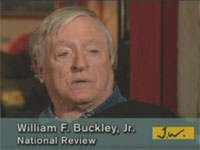
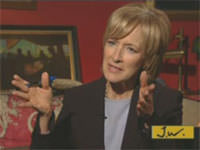
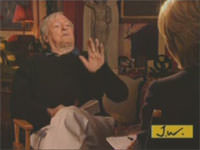
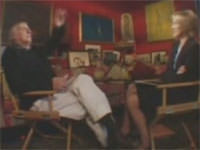
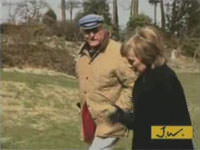
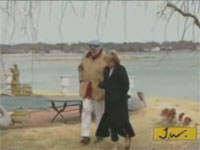

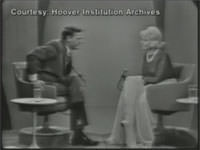



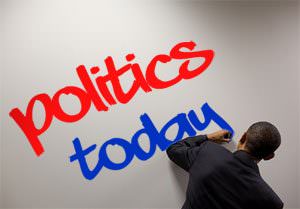
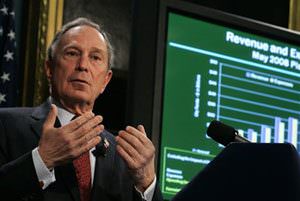


You need to be a supporter to comment.
There are currently no responses to this article.
Be the first to respond.